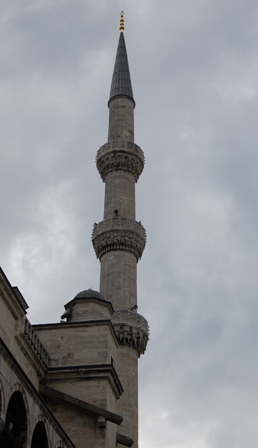According to World Radio Switzerland (WRS), on Sunday, November 30, 2009, Swiss voters passed an initiative to ban Islamic minarets in Switzerland. WRS reported that a “strong majority – 57.5 percent – of voters accepted the initiative Sunday to ban the construction of new minarets… [and that] the “government and major political parties, with the notable exception of the Swiss People’s Party, had called for voters to reject the measure.” WRS further reported that the Swiss Federal Council stated that the “four existing minarets will remain, the statement said, assuring that it will still be possible to construct new mosques and that Muslims in Switzerland ‘are able to practice their religion alone or in community with others, and live according to their beliefs just as before.'”
The United Nations, UN Watch, and columnists in the Christian Post have objected to this decision by the Swiss people.
UN Watch issued a press statement including comments by its executive director Hillel Neuer that stated that:
“‘Singling out Muslims for differential and discriminatory treatment is bigotry, plain and simple, and may irreparably harm Switzerland’s historic reputation as a haven of religious liberty and tolerance,’ said Hillel Neuer, executive director of UN Watch.”
“‘The Swiss ban will almost certainly undermine efforts by the U.S., the EU and other democracies to counter the successful campaign at the United Nations, led by countries like Pakistan, Algeria and Egypt, to prohibit any criticism of Islam as a form of ‘defamation’ and ‘racism’,’ said Neuer. The General Assembly is soon to vote on a ‘defamation of religion’ resolution, while in Geneva an Algerian-led committee is seeking to amend the Convention on the Elimination of Racial Discrimination.”
“At a time when Saudi Arabia is being asked to finally end its ban on churches – where some 1.5 million Christians, many of them Filipino workers, are not allowed to worship publicly – Switzerland’s act of xenophobia marks a setback for the credibility of all international voices calling for tolerance.”
Some view that the towering Islamic minarets represent an architectural problem, a nuisance in terms of loud calls to Islamic prayer five times a day, and others view the minarets as symbols of political Islamic power where they are located. Others point out that the minaret ban vote does not impact Islamic mosques in Switzerland. Still others point to the failure of extremist states to have “reciprocity” in terms of allowing the building of churches and other non-Muslim houses of worship.
But none of these arguments address the point of the matter which is that the Swiss vote to call for a ban on Islamic minarets sends a signal that the Swiss people seek to be “situational” in their acceptance of the basic human right of religious freedom. This is the slippery slope that leads to the undermining of credibility for our universal human rights. Clearly some in Switzerland are stunned and disturbed by this decision, and I have also learned that there are plans underway for a new vote to be taken.
Certainly, some of those complaining the most about the Swiss decision also support some of the worst violations of human rights and religious freedom in the world.
For example, the Egyptian Islamic clerics, led by Grand Sheik Ali Gomaa who have criticized the Swiss decision are certainly questionable sources for defending human rights. This is the same Egypt, where Coptic Christians human rights are abused on a regular basis, where churches are burned to the ground, where mobs of 3,000 intimidate Christians, and where Coptic Christian girls are kidnapped and forced to convert to Islam. Egyptian critic Sheik Ali Gomaa is also known for his threats against moderate Egyptian Muslims, his defense of wife-beating, and his denials of freedom of religion.
Another critic of the Swiss decision is the anti-freedom organization, Hizb ut-Tahrir. While Hizb ut-Tahrir criticizes the Swiss decision, it ignores that it promotes an anti-freedom ideology of extremism that consciously denies religious freedom. At Hizb ut-Tahrir’s Chicago event, I saw HT brochures handed out to 700 attendees that called for the “death penalty” for “traitors” who leave Islam. Once again, the anti-freedom Hizb ut-Tahrir organization (that explicitly calls for an end to democracy and liberty) is hardly a credible source for defending religious freedom.
It should be a wake up call for all those who support human rights when the likes of Sheik Ali Gomaa and Hizb ut-Tahrir are given a platform to call for “religious freedom.”
The arguments by Ali Gomaa and Hizb ut-Tahrir for “religious freedom” are reminiscent of those white supremacists who used the argument of “white rights” to mask their goals in defying equal opportunities for all people and seeking preferential treatment for white Americans.
We must not give such groups that promote extremism the moral high ground on our universal human rights.
Freedom can be unpopular, freedom can be annoying, freedom can seem threatening, and freedom can be inconvenient.
But despite all of this and because all of this, consistency on freedom is essential.
To those who find such towering minarets intimidating, I ask you to consider – can’t the human spirit rise above any structure?
Our power and our strength comes from within humanity, a humanity that has traveled into space, and walked on the moon. A humanity that has sent vehicles out to the stars.
As viewed from our shared Earth, how can any structure cast a shadow on the human spirit?
We are bigger people than that.
In fact, it is the indefatigable human spirit which defends our shared human rights and our shared dignity for one another which gives us the endless hope that…
Love Wins.

